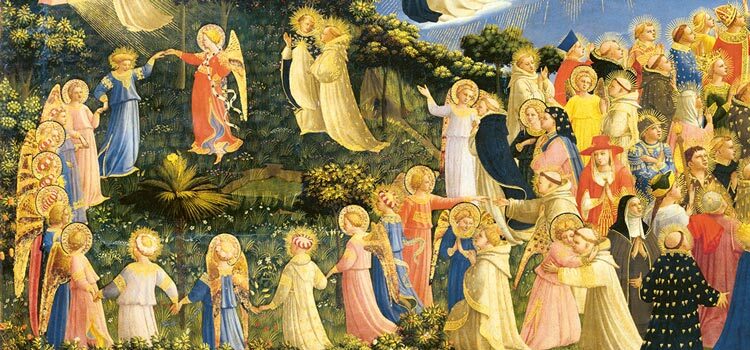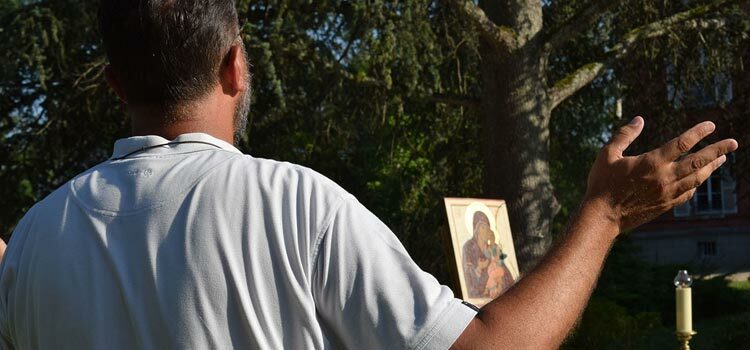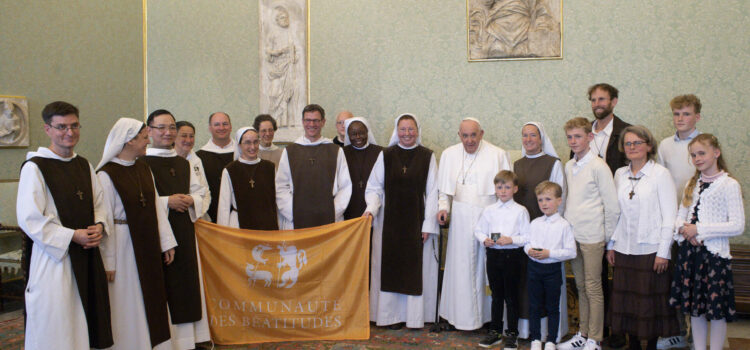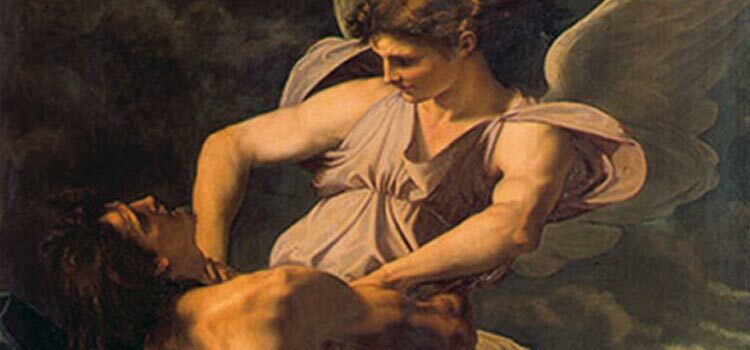In the foreword of the « Ascent of Carmel », St John of the Cross writes: « There are some souls who think they don’t have orison and who, nevertheless, have a lot, and others, on the contrary, think they have a lot and have very little. » In other words, some think they pray well and pray badly and others have the feeling to pray badly (because their prayer is poor) but, in fact, pray very well. This comment compels us to ask ourselves: What makes orison good (draws us nearer to God, transforms us little by little …) or remains superficial?
The answer is simple: For our orison to be good, it has to be an act of faith, an act of hope and an act of love. We meet again the three theological virtues which are essential to the dynamism of our spiritual life, and therefore also of prayer. They unite us to God.
In practice, it is possible to pray in many ways : to meditate on the Scriptures, to open one’s heart to God, to remain in an adoring silence, to pray the rosary or use the Jesus prayer… all those methods are good under one condition, that the basic attitude of our heart be an attitude of faith, hope and love. In this issue, we shall speak about faith. Hope and Love will be treated in other issues.
As soon as a person enters into orison, it involves implicitly an act of faith: I believe God exists, that He loves me, and that it is worthwhile to spend time with Him… This act of faith, often poor, not always suited with intense feelings or great lights, is essential though. Faith is the gateway to a mystical life.
Faith puts us into real contact with God. « The soul is all the more united with God as it has faith » says St John of the Cross in « Ascent of Carmel » Union with God is not measured by the strength of emotion we feel, or by the flow of light which enlightens important part in our prayer life, particularly our intelligence, by the genuineness of our sensitivity and intelligence, but they have to act of faith. Human capacities play an be in the right place.
Role and limits to sensitivity
When our sensitivity is involved, and our heart experiences beautiful emotions, it is a good thing of course. It fosters our faith and makes it more alive, it allows us to experience God, not as an abstract idea but as a living reality, able to deeply touch our heart. However, emotional feelings cannot be the foundation of our prayer life. It is good and necessary to « taste » God, but all we can taste from God is not God yet. He is infinitely greater than anything human sensitivity can comprehend. Therefore we must not cling to it too much. The risk would be to be more interested in God’s gifts, in perceptible tastes, tan in God Himself. We could also worry, believe to be far from God, to feel guilty of praying badly, when we no longer feel anything in prayer. When sensitivity meets with barrenness, we must not worry, but receive it as an invitation to put faith into practice in a purer way, and remember what puts us really in contact with God is not the strength of emotions but the firmness of faith.
Faith makes us free, free to receive with gratitude, the feelings of joy and love, that God favors us with, sometimes but free also to persevere in barrenness, without feeling disturbed. Faith is enough, faith makes us reach God and allows God to touch us and work secretly in our heart. We do not realize it on the spur of the moment but one day, we shall see the fruits of it.
Role and limits of intelligence
We can reflect in the same way on the subject of intelligence. When our intelligence receives some insight on the richness of the mysteries of faith, it is a grace, of course. We must try also, as much as possible, to understand what we believe in, to develop our understanding of the realities of faith. On the subject of our actual life, when we receive some insight on our personal progress, about some decisions to make, it is also very valuable. But then again, we cannot measure the truth of prayer with the amount of ‘lights’ our intelligence receives. God allows periods of darkness sometimes and they are normal. What we understand about God is not God yet. Some truths about faith are beyond our understanding. What is more, God does not answer all our questions and does not always give us all the insights we would love to possess.
Those moments, when our intelligence is in
the dark, can be painful, but they are necessary. They prevent us from falling into the temptation to reduce God within the measure of our intelligence. They purify us also from what can be warped in the exercise of our intelligence. Intelligence is a noble and valuable human faculty but its actual exercise must be purified. In the use of our intellectual faculties, there can be pride of knowledge, curiosity or a search for human security: «I have understood everything so I am alright! » Sometimes there is also the will of exercising power: to know is to control. Our intelligence needs to learn humility, to admit its limits, to break off any claim to control or to dominate. This is why God puts it in the dark sometimes. But then, faith comes to the rescue: I do not understand but this does not prevent me from believing, hoping, loving… St John of the Cross speaks of «faith in which we love God without understanding Him».
There again, faith makes us free, free to receive with joy the insights God grants us, but also free to walk in darkness, committing ourselves to God.
Therefore, it is a great comfort to understand how much faith is the true basis of prayer that really puts us in contact with God, unites us to Him and allows Him to operate in us. Barrennesses and darknesses we meet in our prayer life are painful, but allow us to become adults in faith. This path of faith is not aiming to devalue us or to destroy our human faculties, our sensitivity and intelligence, but to purify them and make them able to reach out to the One who is their ultimate goal.
Paradoxically, the acceptance of periods of barrenness and darkness in prayer will make our sensibility keener, more able to taste God, our intelligence sharper to contemplate the greatness of his mysteries. Let us ask for this resoluteness in faith and call upon Virgin Mary, so that she gives us a share of her faith.
The Quotation
« The Blessed Virgin will give you a share in her faith (…) which will ensure that you do not care for the sensitive and the extraordinary; a faith alive and animated by charity, which will ensure that your actions will only be motivated by pure love; a firm and steadfast faith like a rock that will keep you firm and constant in the midst of storms and torments. » Saint Louis-Marie Grignion de Monfort
Pope Emeritus Benedict XVI«In this regard, we must not forget that the dynamism of desire is always open to redemption. Even when it strays from the path, when it follows artificial paradises and seems to lose the capacity of yearning for the true good. Even in the abyss of sin, that ember is never fully extinguished in man. It allows him to recognize the true good, to savor it, and thus to start out again on a path of ascent; God, by the gift of his grace, never denies man his help. We all, moreover, need to set out on the path of purification and healing of desire. We are pilgrims, heading for the heavenly homeland, toward that full and eternal good that nothing will be able to take away from us. This is not, then, about suffocating the longing that swells in the heart of man, but about freeing it, so that it can reach its true height. When in desire one opens the window to God, this is already a sign of the presence of faith in the soul, faith that is a grace of God. St. Augustin always says: ‘so God, by deferring our hope, stretched our desire; by the desiring, stretches the mind; by stretching, makes it more capacious. » |
TO GO FURTHER…Only for today
Books
|
Find the previous articles in our “Life of prayer” series.
(publication edited by brothers and sisters of the Community of the Beatitudes – © rights reserved).






